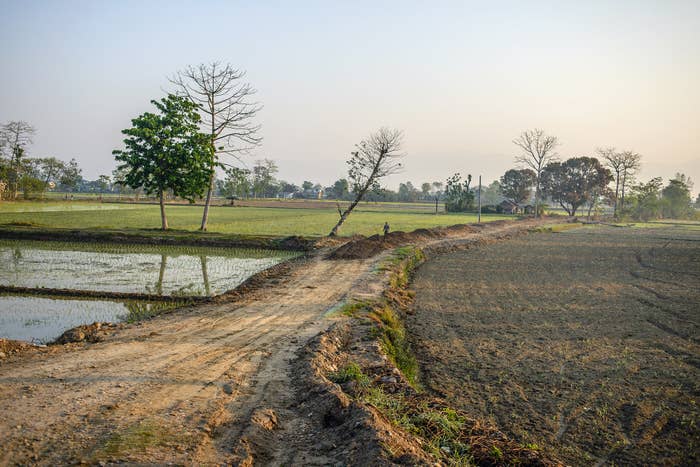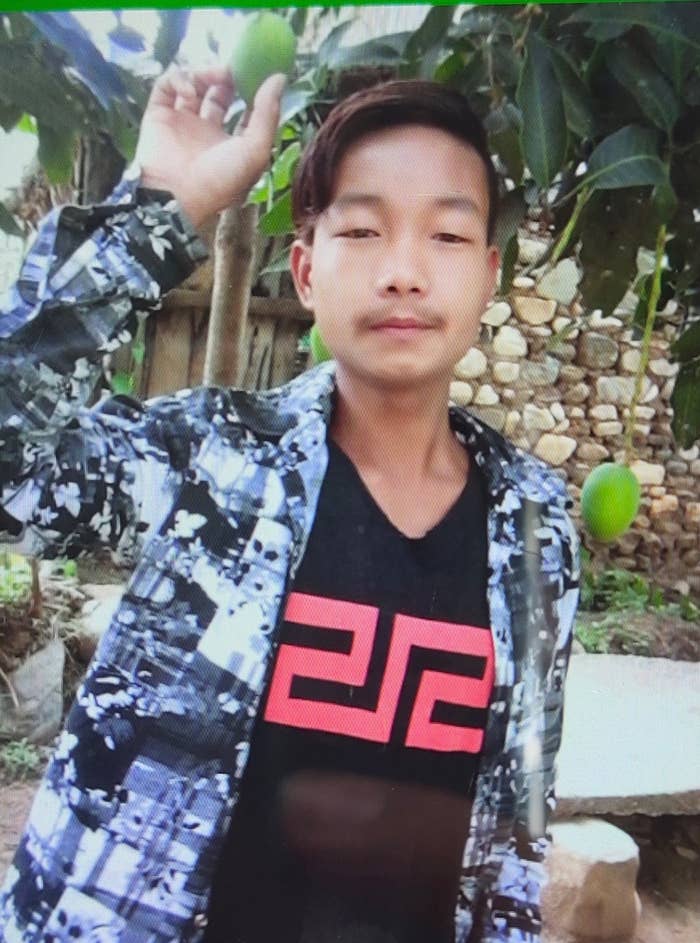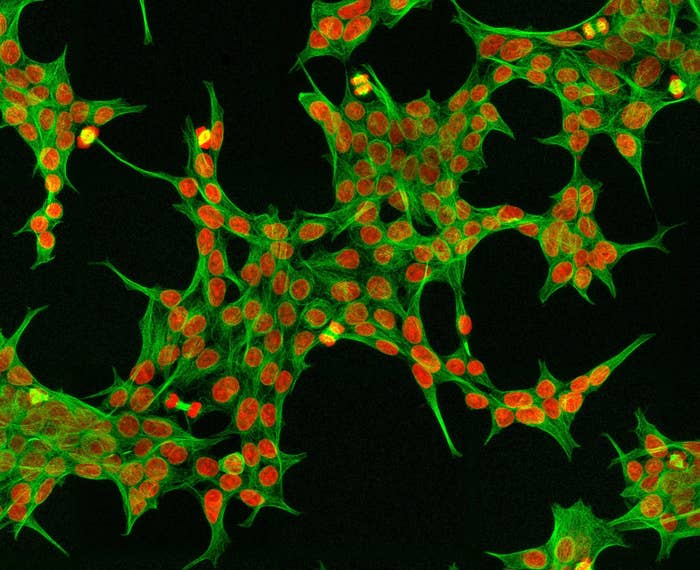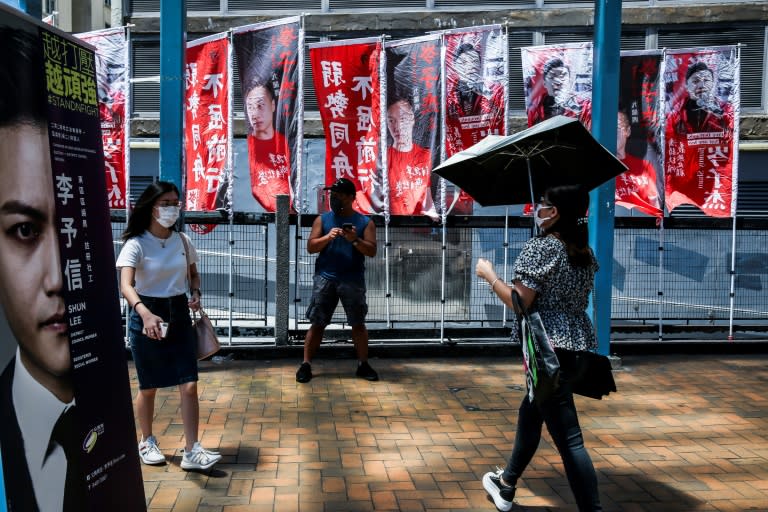A new generation of leaders is looking to change how the city protests. “Omaha isn’t a city that’s known for its resistance.”
Amber Jamieson BuzzFeed News Reporter
Posted on July 31, 2020
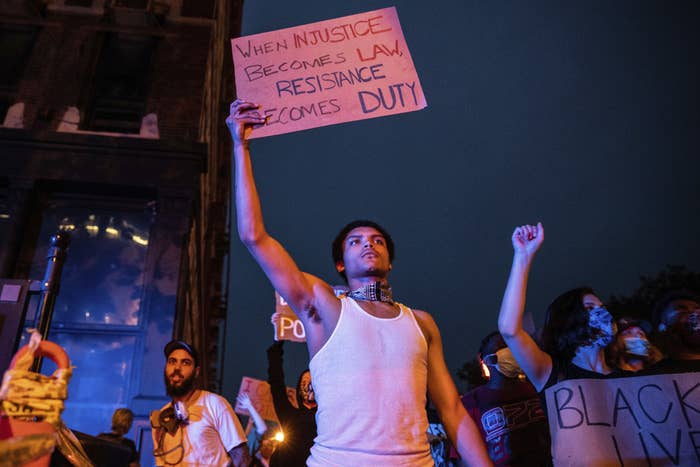
Anna Reed / AP
Protesters march to the Old Market in Omaha, June 3. He and others were demonstrating against the death of James Scurlock.
Police in Omaha, Nebraska, trapped an entire Black Lives Matter protest march on a bridge last Saturday night, funneling all 120 people, including journalists and a legal observer, into police custody and long stretches in jail.
They shot pepper balls at protesters. They tackled the march leader, Bear Alexander, and “started kneeing me in the stomach, kneeing me in the ribs,” he told BuzzFeed News. By the end of it all, every protester was charged.
“It’s psychological warfare,” said Alexander, 23, who is a leader at ProBLAC, a new local Black-led protest group. “They wanted to discourage any future thought of doing direct action.”
Instead, it’s had the reverse effect. Organizers and protesters recently activated by the Black Lives Matter movement in Omaha told BuzzFeed News they are more determined than ever to take to the streets.
Facebook: video.php
Now, four members of the Progressive Black-Led Ally Coalition, or ProBLAC, are currently in Portland, Oregon, where federal officers have brutalized protesters for weeks, to learn best practices for protesting and organizing.
On Thursday, a workshop organized in part by the American Civil Liberties Union offered legal advice to the 120 protesters facing charges.
And earlier this week, protesters testified at a city council hearing about funding night vision goggles for the Omaha police, calling on the city government to slash the police budget.
It has been a long and hard summer of protest in Omaha, where the movement’s new leaders are reacting to the huge cultural forces shaping the nation while fighting the entrenched cultural forces embodied in the state’s now-defunct tourism slogan, “Nebraska Nice.”
“‘Nebraska Nice’ is not protesting. ‘Why would you ruin someone’s Saturday morning?’ ‘Nebraska Nice’ is not talking about race. ‘Why would you do that? Think about all the good things we have in Omaha,’” said Halley Taylor, a 34-year-old biracial Black woman who works as an English teacher at Nebraska’s largest public high school. “It is a cancer.”
Saturday’s march was the first one Alexander has ever led, and it was the first in Omaha since early June. It took place shortly after a white bar owner shot and killed James Scurlock, a 22-year-old demonstrating during the first weekend of Black Lives Matter protests after police killed George Floyd in Minneapolis.
For the protest movement, Scurlock’s death — one of their own, during a demonstration calling for an end to violence against Black bodies — was a major shift.
Jake Gardner, a white bar owner, stood armed outside one of his businesses in the Old Market neighborhood during the protests. After an altercation with two men, Gardner began shooting — he later told authorities they were “warning shots” — and Scurlock, who was not part of the original altercation, jumped on his back to stop him. Gardner shot and killed him. Multiple associates have since come forward to say Gardner was known for making racist comments. Douglas County Attorney Don Kleine declined to charge Gardner, announcing that his actions were in “self-defense.” After public outcry and protest, Kleine announced on June 3 that he would petition for a grand jury.
Even though Scurlock was a young Black father who many believe jumped on Gardner to protect others, protests in his name didn’t begin straight away.
“The night James Scurlock died, the next day we didn’t do anything. It goes to show the type of city Omaha is,” Alexander said. “We were told by our local Black leaders to not do anything — to calm down and go home and to rest, and to let them all handle it.”
Alexander calls himself “a prime example of systematic racism.” At age 20, he spent a year in state prison for selling marijuana. He’d been a third-year college student, wanting to be a teacher, but the felony charge ensured that was impossible, so he learned videography.
The 2020 Black Lives Matter movement shifted his life.
“Me going to prison, it didn't fuel me enough,” said Alexander. “It added a little fire in me, added knowledge and perspective. Those George Floyd protests were what really, really got me. That’s just what took me into hyperdrive.”
Now he’s determined to help lead the movement in Omaha. “Omaha isn’t a city that’s known for its resistance,” he said. “It’s almost a city of obedience.”
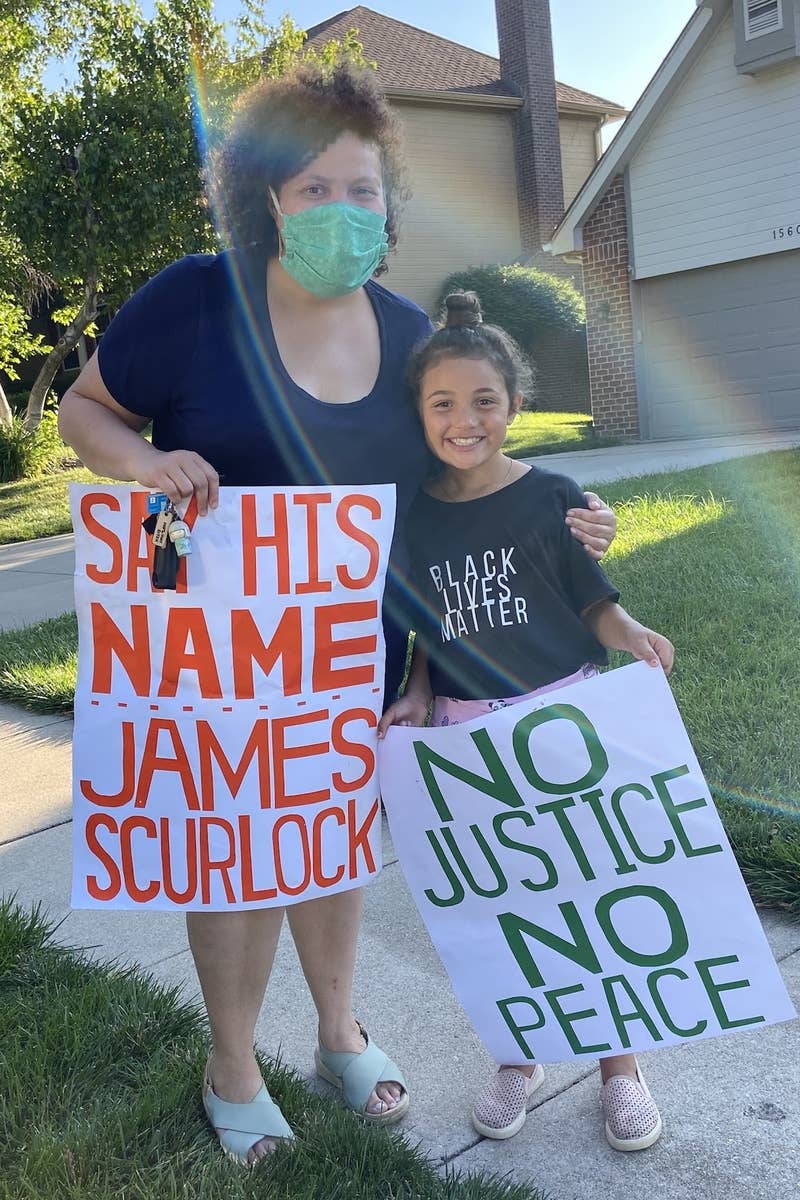
Halley Taylor
Halley Taylor and her little sister hold protest signs.
Taylor, the English teacher, agreed. “Nebraska Nice,” she said, is evidence of the community’s history of upholding the status quo.
“Because of the toxicity of the message of ‘Nebraska Nice,’ what you do not see is a historic culture of protesting here,” she told BuzzFeed News.
Until this summer, Taylor’s activism had been strictly in the classroom, where she leads her school’s “Young, Gifted, and Black” group and teaches her students to stand up against injustice.
It was watching videos of her students and other young people being brutalized by police during the May’s George Floyd demonstrations that compelled her to drive 30 minutes to the protest with water and supplies.
“I saw them screaming for help,” Taylor said. “Begging to be treated humanely by police officers treating them like rag dolls. As a teacher that was horrifying.”
That first protest she was teargassed and shot with pepper balls. The next night, she was one block away from Scurlock in the Old Market area when he was killed.
That shooting, she said, “gave us an opportunity to directly use this injustice he faced to continue why we are protesting.”
“To continue why we were there in the first place — to continue, period,” she said. “This is my Black life, too.”
Taylor grew up in West Omaha, one of the few biracial families in the predominantly white and wealthy area. It’s the same part of town that Kleine lives in, and where she spent 12 days protesting him in June.
For 36 straight days — in response to the 36 hours it took the Douglas County attorney to decide not to press charges after Scurlock was killed — protesters stood outside Kleine’s gated community in West Omaha. The “Justice for James Scurlock” protests were organized by Culxr House, a local creative group and event space.
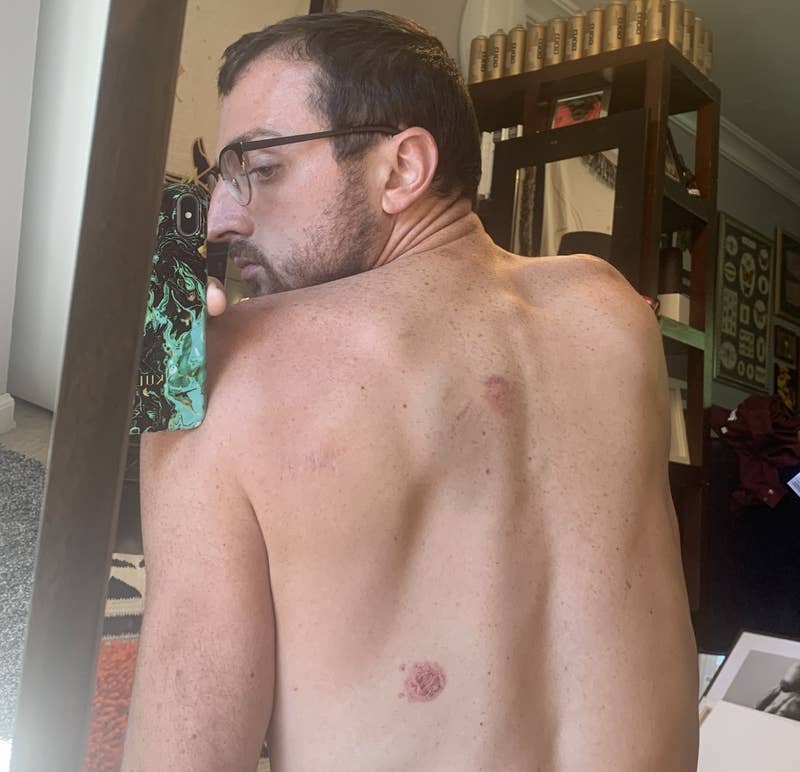
Cole Christensen
Cole Christensen, whom police shot with pepper balls last Saturday night, volunteered as a shift leader during the Scurlock protests, attending 34 days. The 28-year-old knew the man who killed Scurlock personally. He said knowing Gardner’s racist background and that he hasn’t been charged yet moved him into action.
“The message in our eyes being sent to everyone in Omaha is ‘If you are wealthy and white and bring this city money through multiple tacky bars, we will give you a different set of rules, and this is your playground,’” said Christensen, who is white. “We don’t find that acceptable.”
Saturday’s protest was one of many held around the country in solidarity with Portland — but local organizers ensured it was also to honor Scurlock. “We will stand in solidarity with Portland as a call to action to end police brutality while also demanding JUSTICE FOR JAMES SCURLOCK,” read ProBLAC’s announcement.
Protesters gathered on Farnam Street in Midtown at 7:30 p.m. on Friday, an area with more foot traffic and businesses than where protests are traditionally held. After an hour of speeches and chants, Alexander led the group of 150 to 200 on a march through the streets.
Omaha police, in a timeline released Wednesday, said the event’s organizer “did not contact police for safety assistance and had not obtained a parade permit.”
ProBLAC did not work with police nor inform them of their plans in advance — that’s the point. “We will never ask the oppressor how to protest or when to protest against their oppression,” Alexander said.
“This is not a parade,” Taylor said. “This is a protest.”
During the protest, police drove ahead and blocked off cross streets to keep everything orderly. But police said the very act of protesters being in the streets caused them to shut the demonstration down.
“This is the Omaha Police Department; this has been declared an unlawful assembly,” an officer said, according to the police timeline. “You are all subject to arrest. Failure to disperse now will result in your arrest.” Police announced it over a cruiser’s speaker system 10 times between 8:50 p.m. and 9:09 p.m.
Then, 27 minutes passed, and protesters marched an additional 1.2 miles. They were one block from their end point, where the plan, they said, was to hold a minute of silence for Scurlock and then go home. It’s there police used a “kettle” maneuver — condensing a group of people and sometimes funneling them in one direction — with their cruisers on a bridge over the interstate.
Police confronted the protesters.
“It looked like they were ready to go to war,” said Riley Wilson, a 31-year-old law student and veteran who attended the protest as a legal observer. “They had weapons pointed up at people and they said, ‘Everyone is getting arrested; you’re all getting arrested.’”
There was no warning about mass arrests or a call to disperse before arrests began, according to the police’s timeline and eyewitnesses.
When asked why people were arrested, Omaha Police Capt. Mark Matuza told the Omaha World-Herald, "It leaned toward the potential of getting violent." Police also said some construction barrels and barricades had been placed by protesters to stop police cruisers following them. Wilson disputed the police narrative: “There was no violence, no property damage, no fires, no vandalism. Nothing.”
Police also told the World-Herald on Sunday that they deployed one pepper ball, a “less lethal” form of ammunition, and rubber bullets that also contained a chemical irritant.
But eyewitness video shows multiple shots were fired. The timeline released Wednesday by police acknowledged that “PepperBalls,” plural, were deployed.
Christensen, who was at the front of the march when arrests began, sent BuzzFeed News photos that show four separate injuries from pepper balls across his body.
“I was bleeding through my shirt the entire night I was in jail,” Christensen said. The chemical irritant in the pepper balls remained all over his body and mask while he was detained. He could not remove it, even with multiple showers and bottles of soap after returning home.
“It was unreal how aggressive these officers were,” he said.
Police kept Wilson and protesters on the bridge for two hours before leaving them waiting another four hours in a parking lot outside the correction facility and charging them, he said. In that time, their hands were still in zip ties and they were not given any food and only occasional water. Minors were also detained with them, he added.
Facebook: RileyWilson
When Wilson was arrested, he was wearing a high-visibility yellow vest with the words “legal observer” written across it. He spent 22 hours in custody.
Alexander also spent 22 hours in police custody, most of that in solitary confinement. “It was really diminishing and demoralizing,” he said. At one point, he feared he’d been forgotten or that legal services had been unable to help.
A reported computer delay at the Douglas County Correctional Center meant some protesters were imprisoned up to 24 hours, kept in cramped holding cells with more than 40 people and overflowing sewage.
“A deliberate decision was made by [the] Omaha Police Department. The process was as slow as it could possibly be,” said Wilson, a second-year law student at Creighton University. “They could have ended that night and nobody could have been harmed or injured, and they made a willful decision to do what they did.”
Wilson said that when a doctor at the correctional facility was giving him a medical check, a corrections officer leaned in and said to the doctor: “What percentage of these guys do you think are going to do this again after tonight?”
The correctional officer replied to herself, Wilson said: “I bet zero. I bet they’ll see the $500 [bail] and decide it’s not worth it.”
“When she said that, it cemented in my mind the way the whole process is being treated is just to make it as slow and arduous and difficult as possible, and do that deliberately to send a message,” Wilson said. “To make it clear, ‘if you're going to protest the police, if you’re going to protest us, this is the price you’ll pay.’”
After the arrests on Saturday night, the ProBLAC members at the Portland protests suggested that Omaha had to be back out again in the streets the next day.
“They told us, ‘Why aren’t you out? You need to be protesting right now,’” Alexander said. “Omaha just isn’t ready for that — protests back to back to back to back.”
He’s currently organizing a protest calling for the city to defund the police on Aug. 11, during a public hearing on the city’s 2021 budget.
“We have a ways to go,” he said, “but we’re getting there.”
Riley Wilson is with Stacy Gravning and 33 others.
Posted on July 31, 2020

Anna Reed / AP
Protesters march to the Old Market in Omaha, June 3. He and others were demonstrating against the death of James Scurlock.
Police in Omaha, Nebraska, trapped an entire Black Lives Matter protest march on a bridge last Saturday night, funneling all 120 people, including journalists and a legal observer, into police custody and long stretches in jail.
They shot pepper balls at protesters. They tackled the march leader, Bear Alexander, and “started kneeing me in the stomach, kneeing me in the ribs,” he told BuzzFeed News. By the end of it all, every protester was charged.
“It’s psychological warfare,” said Alexander, 23, who is a leader at ProBLAC, a new local Black-led protest group. “They wanted to discourage any future thought of doing direct action.”
Instead, it’s had the reverse effect. Organizers and protesters recently activated by the Black Lives Matter movement in Omaha told BuzzFeed News they are more determined than ever to take to the streets.
Facebook: video.php
Now, four members of the Progressive Black-Led Ally Coalition, or ProBLAC, are currently in Portland, Oregon, where federal officers have brutalized protesters for weeks, to learn best practices for protesting and organizing.
On Thursday, a workshop organized in part by the American Civil Liberties Union offered legal advice to the 120 protesters facing charges.
And earlier this week, protesters testified at a city council hearing about funding night vision goggles for the Omaha police, calling on the city government to slash the police budget.
It has been a long and hard summer of protest in Omaha, where the movement’s new leaders are reacting to the huge cultural forces shaping the nation while fighting the entrenched cultural forces embodied in the state’s now-defunct tourism slogan, “Nebraska Nice.”
“‘Nebraska Nice’ is not protesting. ‘Why would you ruin someone’s Saturday morning?’ ‘Nebraska Nice’ is not talking about race. ‘Why would you do that? Think about all the good things we have in Omaha,’” said Halley Taylor, a 34-year-old biracial Black woman who works as an English teacher at Nebraska’s largest public high school. “It is a cancer.”
Saturday’s march was the first one Alexander has ever led, and it was the first in Omaha since early June. It took place shortly after a white bar owner shot and killed James Scurlock, a 22-year-old demonstrating during the first weekend of Black Lives Matter protests after police killed George Floyd in Minneapolis.
For the protest movement, Scurlock’s death — one of their own, during a demonstration calling for an end to violence against Black bodies — was a major shift.
Jake Gardner, a white bar owner, stood armed outside one of his businesses in the Old Market neighborhood during the protests. After an altercation with two men, Gardner began shooting — he later told authorities they were “warning shots” — and Scurlock, who was not part of the original altercation, jumped on his back to stop him. Gardner shot and killed him. Multiple associates have since come forward to say Gardner was known for making racist comments. Douglas County Attorney Don Kleine declined to charge Gardner, announcing that his actions were in “self-defense.” After public outcry and protest, Kleine announced on June 3 that he would petition for a grand jury.
Even though Scurlock was a young Black father who many believe jumped on Gardner to protect others, protests in his name didn’t begin straight away.
“The night James Scurlock died, the next day we didn’t do anything. It goes to show the type of city Omaha is,” Alexander said. “We were told by our local Black leaders to not do anything — to calm down and go home and to rest, and to let them all handle it.”
Alexander calls himself “a prime example of systematic racism.” At age 20, he spent a year in state prison for selling marijuana. He’d been a third-year college student, wanting to be a teacher, but the felony charge ensured that was impossible, so he learned videography.
The 2020 Black Lives Matter movement shifted his life.
“Me going to prison, it didn't fuel me enough,” said Alexander. “It added a little fire in me, added knowledge and perspective. Those George Floyd protests were what really, really got me. That’s just what took me into hyperdrive.”
Now he’s determined to help lead the movement in Omaha. “Omaha isn’t a city that’s known for its resistance,” he said. “It’s almost a city of obedience.”

Halley Taylor
Halley Taylor and her little sister hold protest signs.
Taylor, the English teacher, agreed. “Nebraska Nice,” she said, is evidence of the community’s history of upholding the status quo.
“Because of the toxicity of the message of ‘Nebraska Nice,’ what you do not see is a historic culture of protesting here,” she told BuzzFeed News.
Until this summer, Taylor’s activism had been strictly in the classroom, where she leads her school’s “Young, Gifted, and Black” group and teaches her students to stand up against injustice.
It was watching videos of her students and other young people being brutalized by police during the May’s George Floyd demonstrations that compelled her to drive 30 minutes to the protest with water and supplies.
“I saw them screaming for help,” Taylor said. “Begging to be treated humanely by police officers treating them like rag dolls. As a teacher that was horrifying.”
That first protest she was teargassed and shot with pepper balls. The next night, she was one block away from Scurlock in the Old Market area when he was killed.
That shooting, she said, “gave us an opportunity to directly use this injustice he faced to continue why we are protesting.”
“To continue why we were there in the first place — to continue, period,” she said. “This is my Black life, too.”
Taylor grew up in West Omaha, one of the few biracial families in the predominantly white and wealthy area. It’s the same part of town that Kleine lives in, and where she spent 12 days protesting him in June.
For 36 straight days — in response to the 36 hours it took the Douglas County attorney to decide not to press charges after Scurlock was killed — protesters stood outside Kleine’s gated community in West Omaha. The “Justice for James Scurlock” protests were organized by Culxr House, a local creative group and event space.

Cole Christensen
Cole Christensen, whom police shot with pepper balls last Saturday night, volunteered as a shift leader during the Scurlock protests, attending 34 days. The 28-year-old knew the man who killed Scurlock personally. He said knowing Gardner’s racist background and that he hasn’t been charged yet moved him into action.
“The message in our eyes being sent to everyone in Omaha is ‘If you are wealthy and white and bring this city money through multiple tacky bars, we will give you a different set of rules, and this is your playground,’” said Christensen, who is white. “We don’t find that acceptable.”
Saturday’s protest was one of many held around the country in solidarity with Portland — but local organizers ensured it was also to honor Scurlock. “We will stand in solidarity with Portland as a call to action to end police brutality while also demanding JUSTICE FOR JAMES SCURLOCK,” read ProBLAC’s announcement.
Protesters gathered on Farnam Street in Midtown at 7:30 p.m. on Friday, an area with more foot traffic and businesses than where protests are traditionally held. After an hour of speeches and chants, Alexander led the group of 150 to 200 on a march through the streets.
Omaha police, in a timeline released Wednesday, said the event’s organizer “did not contact police for safety assistance and had not obtained a parade permit.”
ProBLAC did not work with police nor inform them of their plans in advance — that’s the point. “We will never ask the oppressor how to protest or when to protest against their oppression,” Alexander said.
“This is not a parade,” Taylor said. “This is a protest.”
During the protest, police drove ahead and blocked off cross streets to keep everything orderly. But police said the very act of protesters being in the streets caused them to shut the demonstration down.
“This is the Omaha Police Department; this has been declared an unlawful assembly,” an officer said, according to the police timeline. “You are all subject to arrest. Failure to disperse now will result in your arrest.” Police announced it over a cruiser’s speaker system 10 times between 8:50 p.m. and 9:09 p.m.
Then, 27 minutes passed, and protesters marched an additional 1.2 miles. They were one block from their end point, where the plan, they said, was to hold a minute of silence for Scurlock and then go home. It’s there police used a “kettle” maneuver — condensing a group of people and sometimes funneling them in one direction — with their cruisers on a bridge over the interstate.
Police confronted the protesters.
“It looked like they were ready to go to war,” said Riley Wilson, a 31-year-old law student and veteran who attended the protest as a legal observer. “They had weapons pointed up at people and they said, ‘Everyone is getting arrested; you’re all getting arrested.’”
There was no warning about mass arrests or a call to disperse before arrests began, according to the police’s timeline and eyewitnesses.
When asked why people were arrested, Omaha Police Capt. Mark Matuza told the Omaha World-Herald, "It leaned toward the potential of getting violent." Police also said some construction barrels and barricades had been placed by protesters to stop police cruisers following them. Wilson disputed the police narrative: “There was no violence, no property damage, no fires, no vandalism. Nothing.”
Police also told the World-Herald on Sunday that they deployed one pepper ball, a “less lethal” form of ammunition, and rubber bullets that also contained a chemical irritant.
But eyewitness video shows multiple shots were fired. The timeline released Wednesday by police acknowledged that “PepperBalls,” plural, were deployed.
Christensen, who was at the front of the march when arrests began, sent BuzzFeed News photos that show four separate injuries from pepper balls across his body.
“I was bleeding through my shirt the entire night I was in jail,” Christensen said. The chemical irritant in the pepper balls remained all over his body and mask while he was detained. He could not remove it, even with multiple showers and bottles of soap after returning home.
“It was unreal how aggressive these officers were,” he said.
Police kept Wilson and protesters on the bridge for two hours before leaving them waiting another four hours in a parking lot outside the correction facility and charging them, he said. In that time, their hands were still in zip ties and they were not given any food and only occasional water. Minors were also detained with them, he added.
Facebook: RileyWilson
When Wilson was arrested, he was wearing a high-visibility yellow vest with the words “legal observer” written across it. He spent 22 hours in custody.
Alexander also spent 22 hours in police custody, most of that in solitary confinement. “It was really diminishing and demoralizing,” he said. At one point, he feared he’d been forgotten or that legal services had been unable to help.
A reported computer delay at the Douglas County Correctional Center meant some protesters were imprisoned up to 24 hours, kept in cramped holding cells with more than 40 people and overflowing sewage.
“A deliberate decision was made by [the] Omaha Police Department. The process was as slow as it could possibly be,” said Wilson, a second-year law student at Creighton University. “They could have ended that night and nobody could have been harmed or injured, and they made a willful decision to do what they did.”
Wilson said that when a doctor at the correctional facility was giving him a medical check, a corrections officer leaned in and said to the doctor: “What percentage of these guys do you think are going to do this again after tonight?”
The correctional officer replied to herself, Wilson said: “I bet zero. I bet they’ll see the $500 [bail] and decide it’s not worth it.”
“When she said that, it cemented in my mind the way the whole process is being treated is just to make it as slow and arduous and difficult as possible, and do that deliberately to send a message,” Wilson said. “To make it clear, ‘if you're going to protest the police, if you’re going to protest us, this is the price you’ll pay.’”
After the arrests on Saturday night, the ProBLAC members at the Portland protests suggested that Omaha had to be back out again in the streets the next day.
“They told us, ‘Why aren’t you out? You need to be protesting right now,’” Alexander said. “Omaha just isn’t ready for that — protests back to back to back to back.”
He’s currently organizing a protest calling for the city to defund the police on Aug. 11, during a public hearing on the city’s 2021 budget.
“We have a ways to go,” he said, “but we’re getting there.”
Riley Wilson is with Stacy Gravning and 33 others.
As some of you may or may not have heard, I was arrested by the Omaha police over the weekend while I was acting as a legal observer during the protest that took place between the Midtown and Downtown areas.
As a legal observer, I was wearing a yellow reflective vest clearly marked with "LEGAL OBSERVER" on both the front and back. I am bound to the same laws as any other citizen, and for this reason, I was very careful to adhere to all applicable laws as I observed a protest as it was occurring, not taking part in it. This means I kept on the sidewalk, observed all crosswalk signs, etc., however, none of this mattered to Omaha police when an officer grabbed me by the upper arm/shoulder and kick swiped me to the ground and yelled at me and others to stay down.
As the protest moved back towards Midtown, and was only blocks away from where it started, the police, comprised of Omaha SWAT and Omaha Police Gang Unit members, blocked the protesters, journalists, and myself in on both sides of an overpass bridge and proceeded to conduct mass arrests. They pointed weapons at the crowd, shot pepper bullets at people, and indiscriminately arrested those in the area. Among some of the first to be attacked by the Omaha police was Mark Benjamin Vondrasek and Bear Alexander. I heard one officer bragging to a group of predominately women who were zip-tied and on the ground that he was strong enough to beat any of them up.
I, along with roughly 100+ protesters, were zip-tied for approximately 6 hours. During this period, protesters were denied water for a long period of time, and one protester even passed out, hit his head on the concrete, and was hospitalized, before eventually being brought back to Douglas County Corrections. Trans individuals were placed in solitary confinement (ostensibly for their own protection). At one point, 43 of us were placed in Holding Cell 1, a holding cell fit for perhaps 15 to 20 people maximum if I had to guess. The cell became increasingly hot, and request after request for keeping the door open for fresh, cool air was denied. One of the correction officers told the women being held in Holding Cell 6 that their conditions could be blamed on "Sinéad O'Connor," referencing Taylor Leigh.
Despite being eligible for bail, many of our friends, family, and The Nebraska Left Coalition (NLC) were unable to actually pay for people's bail, as they were told that the "system was down." I would like to thank NLC for their assistance this weekend. So many of us in jail were very thankful for their nonstop work on the outside to ensure that our bail was posted. If you can make a donation to them, know that your money is going to a good cause. In addition, I would also like to thank Peyton Zyla (who should be credited for the video below), Jazari Kual of Kualdom Creations, and Melanie Buer for documenting the events that took place on Saturday night.
All in all, I was detained for roughly 22 hours before finally being released shortly after 7pm on Sunday night.
For those who have told so many of us for so long that they do not disagree with the message that we offer, but simply disagree with the tactics and wish to see peaceful protests over violent riots, this is exactly the type of protesting you should be applauding. Acts of civil disobedience that bring attention to the most abhorrent acts of our government are noble and deserve the respect of any decent human.
The Omaha police arrived to the scene ready to escalate and harm people who were taking part in a peaceful protest; they made the willful decision to cause harm to peaceful protesters when they had the opportunity to escort protesters along the route and ensure the safety of drivers and protesters alike, but they did not. If you truly believe that violence is not the answer, I hope to hear you make a forceful stand against the behavior of Omaha police that we all witnessed in our city this weekend.
The police continue to be the source of the problem, which is exactly why it is so necessary for us to defund the police, with a move towards abolition, and reallocate those resources to actual programs within our city that help people, not hurt them, such as affordable housing, libraries, healthcare, skills training and jobs programs, education, mental health resources, crisis and substance abuse counselors, and social workers. There is a better future for our city, and it can begin when we choose to make a policy decision that elects help over harm and people over profit.
Lastly, if you were arrested on Saturday night or know somebody who was, please let me know so that I can tag you/them in this post.




